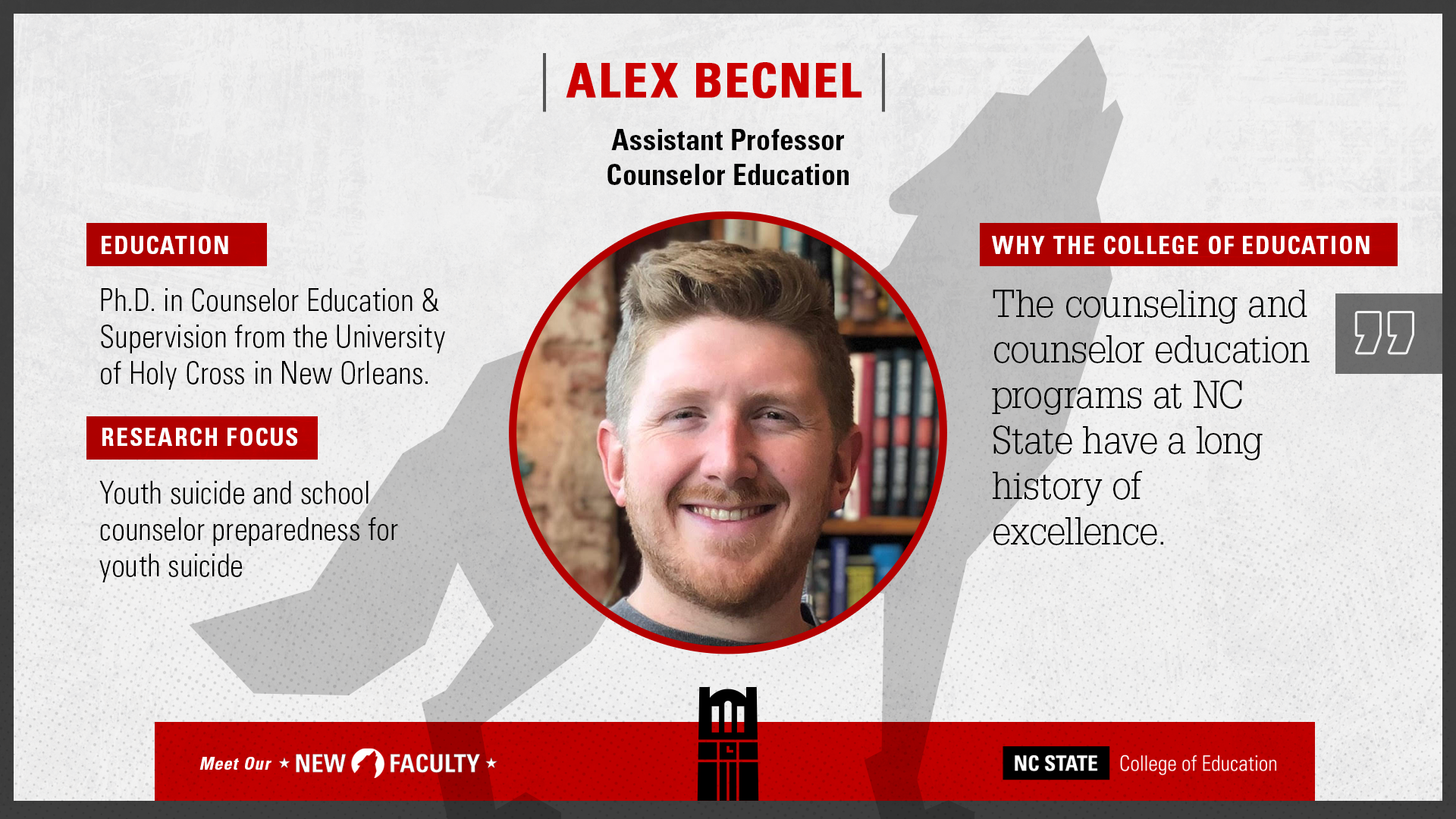Meet Alex Becnel: ‘I Think Students Get the Most Out of Their Education When They Receive the Personal Attention and Guidance of a Good Mentor’

Alex Becnel is joining the NC State College of Education in the 2024-25 academic year as an assistant professor in counselor education.
Becnel previously served as an assistant professor at Kansas State University in the Department of Special Education, Counseling, and Student Affairs. He earned his Bachelor of Arts in Communication Studies at Louisiana State University, and both his Master of Arts in Counseling and his Ph.D. in Counselor Education & Supervision from the University of Holy Cross in New Orleans.
Learn more about Becnel below:
The following Q&A has been edited for length and clarity.
Why did you choose a career in education?
Throughout my life, both of my parents emphasized the importance of education. My mom was a middle school art teacher for 25 years, and my dad’s first career was as a physical education teacher. I’ve always enjoyed being at school (yes, even in high school!), and I especially loved the college atmosphere. I also had numerous teachers along my educational path who inspired me and impacted my life beyond the classroom. I am also deeply passionate about the field of counseling, and I want to spread the passion to others. Being a counselor educator seemed like the best way to do that!
What inspired you to pursue a doctoral degree?
When I was a master’s student at the University of Holy Cross in New Orleans, I attended a study abroad opportunity in Italy with Dr. Ted Remley. During that trip, I talked about my interest in doing research as part of my future career, and he encouraged me to consider getting a Ph.D. After working in the field as a school counselor, I realized that I missed the research and writing aspects of my graduate program and decided to go back for my doctorate. I really enjoyed working as a counselor (both in schools and clinical settings), but higher education feels like my ideal home.
What are your research interests?
My primary research interest is youth suicide and school counselor preparedness for youth suicide. My other interests include rural school counseling and using technology in counselor education.
What sparked your interest in those topics?
When I worked as a school counselor, one of my students died by suicide. In the aftermath of the student’s death, I felt lost as I tried to help the school community heal while simultaneously grieving the student’s death myself. This experience affected me deeply and triggered a desire to ensure that all school counselors are adequately prepared for suicide prevention, assessment and postvention.
My interest in rural school counseling arose while working at Kansas State University. I did some grant-funded work with rural communities and saw their need for more resources, especially for suicide prevention and education.
My interest in technology came from my experiences of teaching online in the wake of COVID-19. Many counselor educators struggled with the initial transition from in-person teaching to online teaching. As online courses become utilized more frequently in counselor education, it is important that we develop evidence-based pedagogies that address the needs of our future counselors.
What is one moment or project in your academic career that you are particularly proud of?
I am particularly proud of a project that I co-led in Kansas that was funded by the U.S. Department of Agriculture. In the program, our team provided suicide gatekeeper training to nine predominately rural counties in southeastern Kansas. This training is designed to prepare any community to identify individuals who are potentially at-risk for suicide and to connect those individuals to necessary mental health services. We also helped them develop referral lists for mental health resources in the nine-county area that these gatekeepers could use and distribute in their community. This work was vital for the community, as the suicide rate in the area is three times higher than the national average.
What is your teaching philosophy?
I believe that the learning environment, especially in counselor education, needs to feel safe. As students are learning to become counselors, they are inevitably learning about themselves and their own vulnerabilities. This process can be intimidating for many students, so I believe that it is my responsibility to establish a climate of safety so that students can effectively explore their ideas and beliefs. I also believe that students best learn counseling skills through experiences and practice. Whether through role plays or live observations, I always try to get students exposed to real-life counseling.
What do you hope your students will learn from you?
I hope that my students will develop a passion for the counseling profession! I believe that great counselors, especially those who work with children and adolescents, are needed now more than ever. It is a great field with rewarding work!
What do you believe makes an extraordinary educator?
I believe in the value of mentorship. Effective classroom instruction is necessary, but I think students get the most out of their education when they receive the personal attention and guidance of a good mentor. I also strive to share professional opportunities with students. When I was a doctoral student, my mentors often included me in their professional conference presentations and scholarly activities. I am very happy to collaborate on research projects or offer to co-present programs with my students.
- Categories:


